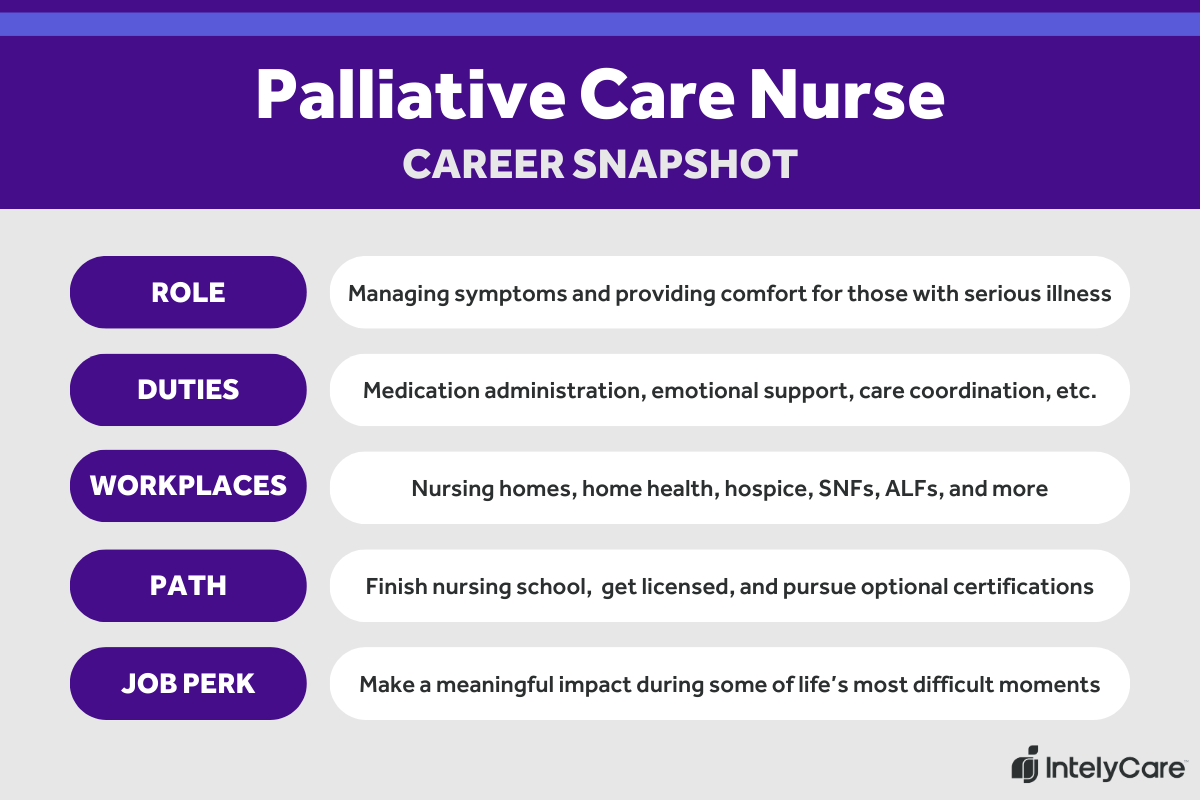
How to Become a Palliative Care Expert: Step-by-Step Guide
Are you looking to make a real difference in people’s lives? Becoming a palliative care professional might be your calling.
This field is not just about medical support; it’s about providing comfort, compassion, and dignity to those facing serious illnesses. Imagine having the skills to ease pain, calm fears, and offer emotional support to patients and their families during their most challenging times.
You can be the beacon of hope they desperately need. In this guide, you’ll discover the steps to enter this rewarding career, the skills you’ll need, and the impact you can make. Dive in to learn how you can transform your passion for helping others into a fulfilling profession. Your journey to making a meaningful difference starts here.
Understanding Palliative Care
Becoming a palliative care expert involves understanding patient needs and providing compassionate support. Training focuses on pain management and emotional care. Successful professionals communicate effectively and offer comfort during challenging times.
Understanding Palliative Care Palliative care is a specialized field of healthcare that focuses on providing relief from the symptoms and stress of serious illness. It’s about improving the quality of life for both patients and their families. If you’ve ever wondered how healthcare professionals bring comfort and dignity to those facing life-limiting conditions, this is the heart of palliative care.
Core Principles
Palliative care prioritizes patient comfort and autonomy. It revolves around understanding the needs and wishes of the patient. Care is tailored to manage symptoms like pain, nausea, and fatigue. Communication is a cornerstone. Professionals engage in open dialogues with patients and families, guiding them through decisions with empathy and clarity. This approach ensures that care aligns with the patient’s values and goals. Interdisciplinary teamwork is essential. Doctors, nurses, social workers, and chaplains collaborate to address physical, emotional, and spiritual needs. This holistic approach creates a supportive environment for everyone involved.
Importance In Healthcare
Palliative care plays a crucial role in the healthcare system. It reduces unnecessary hospital visits and treatments, focusing instead on comfort and meaningful experiences. This shift can ease the emotional and financial burden on families. Consider a patient with advanced cancer. Rather than pursuing aggressive treatments with limited benefits, palliative care might focus on pain management and quality time with loved ones. This approach can transform the patient’s experience, providing solace during difficult times. Have you thought about how palliative care could impact healthcare in your community? By advocating for its integration, you can contribute to a more compassionate healthcare landscape. Recognizing the importance of palliative care is the first step toward ensuring everyone receives the dignity and support they deserve.
Educational Pathways
Choosing a career in palliative care is rewarding. It requires dedication and compassion. The journey begins with the right education. Understanding the educational pathways is crucial. This ensures you provide the best care for patients. Let’s explore the educational paths available.
Relevant Degrees
A degree in nursing or medicine lays the foundation. These degrees teach vital skills. They cover patient care, medical ethics, and communication. Bachelor’s programs in nursing usually last four years. Medical degrees can take longer. Each program offers hands-on experience. This prepares you for real-world situations.
Specialized Courses
Specialized courses enhance your knowledge. They focus on palliative care principles. Courses include pain management and end-of-life care. Certifications in these areas are valuable. They demonstrate your commitment and expertise. Online platforms offer flexibility for these courses. This allows you to learn at your own pace.
Essential Skills
Becoming a palliative care provider demands a unique set of skills. These skills ensure patients receive compassionate and effective support. Essential skills for palliative care include communication techniques and emotional resilience.
Communication Techniques
Effective communication is crucial in palliative care. Listening actively helps understand patients’ needs and concerns. Speak clearly and use simple language to avoid confusion. Non-verbal cues, like gestures and facial expressions, convey empathy. Encourage open conversations. This builds trust and comfort.
Emotional Resilience
Palliative care can be emotionally challenging. Providers need strong emotional resilience. Handle stress and sadness with grace. Develop coping strategies. Practice self-care regularly. This maintains mental well-being. Support networks offer help during tough times. Sharing experiences with colleagues lightens emotional burdens.

Certification And Licensing
Becoming a palliative care specialist requires dedication. Certification and licensing are crucial steps. They ensure you meet professional standards. This section guides you through the process.
Required Certifications
A palliative care specialist needs specific certifications. These validate your expertise. The American Board of Hospice and Palliative Medicine offers certification. This certification is highly respected. It confirms your skills in managing serious illnesses.
To qualify, you must have a medical degree. Clinical experience in palliative care is also essential. Courses in pain management and communication are recommended. They enhance your capabilities. Certification exams test your knowledge and proficiency.
Licensing Process
Licensing is mandatory for practicing legally. It protects patients and professionals. Each state has its own requirements. Know the rules where you intend to practice. Usually, a medical license is needed. This proves your competence to provide care.
Licensing involves several steps. Submit your educational credentials. Pass the necessary exams. Some states require continuing education. This ensures you stay updated. Renewal of your license may be periodic. This keeps standards high.
Gaining Practical Experience
Building practical skills is essential for anyone aiming to excel in palliative care. Volunteering at local hospices offers firsthand experience. Observing experienced caregivers helps understand patient needs and emotional support. Engaging in such activities enhances knowledge and competence in the field.
Gaining practical experience is a crucial step in your journey to becoming a proficient palliative care provider. It’s where you bridge the gap between theoretical knowledge and real-world application. Through hands-on practice, you refine your skills, learn to adapt to challenging situations, and, most importantly, develop empathy and compassion for your patients.
Internships And Residencies
Internships and residencies offer invaluable real-world experience. These programs place you in a clinical setting, allowing you to work alongside seasoned professionals. You get to observe, learn, and gradually take on responsibilities under supervision. During my residency, I learned the importance of communication. I remember a day when a family was struggling with a loved one’s prognosis. Being present and listening made a significant difference in their experience. Are you ready to handle such emotionally intense situations? Internships and residencies help you build the confidence and skills to do so.
Volunteering Opportunities
Volunteering is another excellent way to gain practical experience. It offers flexibility and the chance to work in diverse environments. You can volunteer at hospices, hospitals, or community organizations that provide palliative care services. A friend of mine volunteered at a local hospice and found it incredibly rewarding. She often spoke of the deep connections she formed with patients and their families. These experiences enriched her understanding and made her a more compassionate caregiver. Consider volunteering to broaden your perspective and learn in a less formal setting. What better way to develop your skills while giving back to the community?

Advanced Training Programs
Embarking on a career in palliative care is both rewarding and challenging. Advanced training programs are essential for equipping healthcare professionals with the skills needed to make a significant impact. These programs offer specialized knowledge that goes beyond basic medical education, preparing you to provide compassionate care to patients facing serious illnesses.
Fellowship Opportunities
Fellowships in palliative care offer immersive learning experiences. They often last one to two years and provide hands-on training under the guidance of experienced mentors. Consider applying to reputable institutions known for their robust palliative care programs.
For instance, the University of California, San Francisco offers a fellowship program that emphasizes interdisciplinary teamwork. You’ll work alongside physicians, nurses, social workers, and chaplains, gaining insights from each discipline. Such experiences will enrich your understanding of patient-centered care.
Have you ever thought about how these fellowships could shape your career? They not only enhance your clinical skills but also broaden your perspective on holistic patient care. A fellowship might be the stepping stone to a leadership role in your future.
Continuing Education
Palliative care is an evolving field, requiring continuous learning. Continuing education keeps you updated with the latest practices and research findings. Many organizations offer online courses and workshops tailored to your needs.
Harvard Medical School’s online courses, for example, focus on pain management and communication strategies. These courses are flexible, allowing you to balance them with your busy schedule. They are designed to be practical, providing actionable tips to implement immediately.
How do you stay current in your practice? Consider joining professional networks or attending conferences. These platforms offer opportunities to exchange ideas with peers and learn from experts. By engaging in continuing education, you ensure that your skills remain sharp and relevant.
Advanced training programs are more than just a credential; they are pathways to becoming a compassionate and effective palliative care professional. Are you ready to take the next step in your journey?
Networking And Professional Development
Networking and professional development are key steps in a palliative care career. Building connections opens doors to opportunities and enhances skills. Engaging with peers and experts enriches your professional journey. Let’s explore some effective ways to grow your network and skills in this field.
Joining Professional Organizations
Joining professional organizations in palliative care offers many benefits. Members gain access to a wealth of resources and updates. These organizations often host events and offer educational materials. They provide forums to connect with other professionals. This helps in exchanging ideas and experiences.
Such networks also provide mentorship opportunities. Experienced members guide newcomers in their career paths. Participating in these organizations can also boost your credibility. It shows commitment to your field and continuous learning.
Attending Conferences And Workshops
Conferences and workshops are vital for professional growth. They offer chances to learn from industry leaders. Attendees can engage in discussions about the latest practices. Workshops often include hands-on sessions. These help in gaining practical experience.
Such events also foster networking with peers. Meeting others in the field can lead to collaborations. These connections can be invaluable for career advancement. Attending these events keeps you informed and inspired.
Challenges In Palliative Care
Becoming a palliative care provider involves understanding complex patient needs and managing emotional challenges. Effective communication and empathy are crucial in supporting patients and families. Continuous learning and adapting to diverse situations enhance care quality in this compassionate field.
Challenges in Palliative Care Working in palliative care is deeply rewarding but comes with unique challenges. You’re not just providing medical care; you’re supporting individuals and families through difficult times. Understanding these challenges can better prepare you for a career in this demanding yet fulfilling field.
Emotional And Ethical Challenges
You’ll face emotional challenges daily, as palliative care involves supporting patients nearing the end of life. It’s hard to see people in pain and families in distress. You need to develop emotional resilience while maintaining empathy. Ethical dilemmas are common. You might question whether the care you’re providing aligns with the patient’s wishes. Clear communication is essential to navigate these situations effectively. Consider the story of a nurse who struggled with balancing a patient’s desire for more aggressive treatment against the medical advice to focus on comfort. This experience taught her the importance of advocating for what the patient values most. How would you handle such a complex situation?
Work-life Balance
Maintaining work-life balance in palliative care can be tough. Long shifts and emotionally draining days are common. It’s important to find time to recharge and focus on your well-being. Create boundaries between work and home life. This might mean setting aside specific times to disconnect from work-related thoughts. What strategies could you use to ensure you have time for yourself? Consider joining support groups or seeking mentorship from experienced professionals. This not only helps in managing stress but also provides a network to share experiences and advice. Engaging with peers can offer new perspectives and coping strategies. In palliative care, facing challenges head-on with a proactive mindset will help you grow both professionally and personally.
Career Opportunities
Embarking on a career in palliative care opens doors to fulfilling opportunities. This field is all about making a meaningful impact on patients’ lives as they navigate challenging health journeys. Whether you’re drawn to working in hospice settings, hospitals, or providing care in homes, the possibilities are vast and rewarding. Let’s delve into these career paths and see where you might find your calling.
Hospice And Hospital Roles
Hospice facilities focus on the comfort and dignity of patients in their final days. Working in hospice can be deeply rewarding, offering a chance to provide compassionate care and support to patients and their families.
Hospitals also offer palliative care roles. Here, you can collaborate with a multidisciplinary team to manage complex cases. You can make a difference by ensuring effective pain management and emotional support.
Both settings require empathy and strong communication skills. You will be interacting with patients from diverse backgrounds, each with unique needs. Consider whether you prefer the structured environment of a hospital or the more intimate setting of a hospice.
Community And Home Care
If you prefer a more personal touch, community and home care might be your path. This role allows you to work directly with patients in their homes, providing tailored support and care.
Community care involves educating families and caregivers. You help them navigate the complexities of palliative care, ensuring they understand the process and options available. This can be an empowering experience for them and a fulfilling one for you.
Home care offers flexibility and autonomy. You can develop close relationships with patients and their families, offering comfort and a listening ear in familiar surroundings. Consider if you thrive in environments where you set your own pace and schedule.
Which path resonates with you? Each offers unique challenges and rewards. Dive into a career in palliative care and find where your passion meets purpose.

Frequently Asked Questions
What Is Palliative Care?
Palliative care is specialized medical care for people with serious illnesses. It focuses on providing relief from symptoms and stress. The goal is to improve quality of life for both the patient and the family. This care is provided by a team of doctors, nurses, and other specialists.
How Can I Become A Palliative Care Nurse?
To become a palliative care nurse, start with a nursing degree. Gain experience in a healthcare setting. Pursue further certification in palliative care. This specialized training enhances your skills in managing complex patient needs. Continuous education and compassion are key to success in this field.
What Qualifications Are Needed For A Palliative Care Physician?
A palliative care physician needs a medical degree and residency completion. Additional fellowship training in palliative care is essential. Board certification in palliative medicine enhances credibility. Strong communication and empathy skills are vital. Continuous learning and experience in symptom management are crucial for success.
Why Is Communication Important In Palliative Care?
Communication is crucial in palliative care for understanding patient needs and wishes. It helps build trust and ensures personalized care. Effective communication among healthcare teams improves coordination. It also supports families in decision-making. Good communication skills enhance patient and family satisfaction and care outcomes.
Conclusion
Embarking on a palliative care career is both rewarding and meaningful. It requires compassion, dedication, and a desire to help others. You need to gain the right education and hands-on experience. Building strong communication skills is crucial. These skills help in understanding patients’ needs better.
Remember, every step you take makes a difference. Support from mentors and peers can guide you further. Stay committed to continuous learning and personal growth. Your work will bring comfort and peace to many lives. Keep your passion alive, and you’ll succeed in this noble field.




